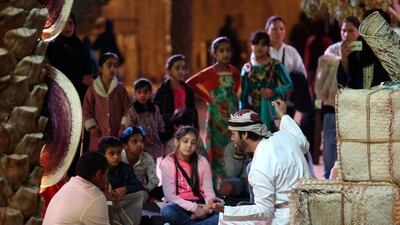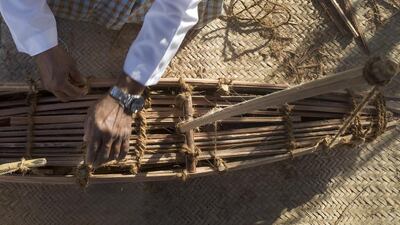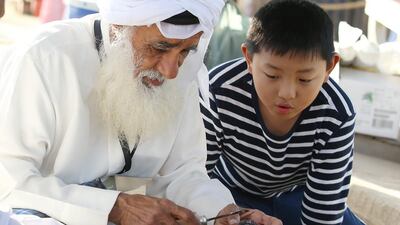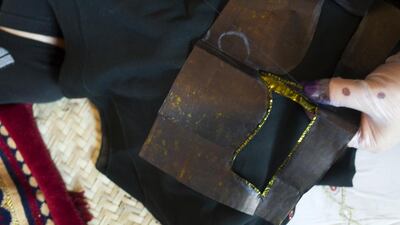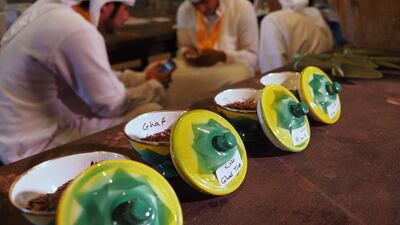Almost everywhere you turn, there is something new and interesting to do or see at this year’s Qasr Al Hosn Festival, which runs until February 13.
To get the most out of the experience, it pays to slow down and take the time talk to the vendors about their products and to exhibitors who are showcasing their crafts and life stories. Don’t be shy – and if language is a barrier, there are festival ambassadors on hand to help.
Your Dh10 entry fee includes activity passes for any two of the workshops or activities – extra passes cost Dh5 each.
In the retail sections, look out for antiques among the newer items – if you are interested in old dial-up phones, radios, cameras and pots you are in for a treat.
If you are driving, parking costs Dh50 for the day at the festival, with the option to park and pay at Mawaqif near the festival. A park-and-ride service is also available from Al Manhal Palace.
Here are a few festival highlights from Rym Ghazal:
Traditional tales
In each of the marine, desert and oasis zones, there is a corner dedicated to storytelling – or Kharaarif – where a narrator recounts traditional stories and fables covering everything from naughty, mischievous jinns to talking animals and bedtime stories. Told in a theatrical and engaging way, don’t be surprised to see children and adults from the audience adding their own twists to the tales. The stories are told in Arabic, but festival assistants can translate the stories. The sessions begin at 4.30pm and continue every hour until 10pm.
All at sea
If you love the sea, then sit with the sailors at the Shasha Boat section in the marine area, where you can help them make a model dhow from parts of a palm tree, or an oyster net or a sail. You can buy then buy the model, too. The price is negotiable depending on size and time spent on it.
Pearls of wisdom
Oyster opening is proving popular with visitors. Step aboard a dhow to see how oysters are opened and try it out – if your oyster contains a pearl, you can buy it for Dh40. But the real treasure is veteran sailor Ahmed Al Hammadi, who shares fascinating stories and his immense knowledge about sea life and pearl diving.
All about the burqa
The burqa-making workshop in the island Zone is the place to find out about different designs and styles and how to make them. If you know how to sew, you can join in and make your own burqa. The women in the workshop are funny, friendly and happy to talk about their craft, the first pieces they made and how young women wear burqas that show more of the face, while as they get older, the burqa gets bigger to “cover more of the wrinkles”. For about Dh25, you can buy a ready-made burqa – or make one under the guidance of the experts.
Food for thought
It is not every day that you get a chance to learn how to cook a traditional Emirati dish under the guidance of a famous local chef. In the cooking class workshop, chef Musabbeh Al Kaabi charmingly takes the lead. Everything you will need is provided just follow along and then tuck into the dish you’ve made. There are 16 dishes in all, with the schedule posted at the workshop, including majboos rice with chicken, marqoq (special curry chicken with bread), and lamb thareed (stew) with dry lemon.
Where things grow
Children can play the role of a “heritage gardener” at the gardening club, where they will learn how to identify plants and seeds, plant them in pots decorated with their names and take them home to continue caring for them. The four types of plants are: the prickly arta shrub, the Ghaf tree (the national tree of the UAE), Markh and Rimth, with its thick trunk.
Pet corner
Don’t miss the chance to get close, pet and ask about the animals that are part of traditional Bedouin culture. The creatures in the petting zoo include Arabian horses, Salukis, goats and, of course, camels. If you catch it at the right time – there doesn’t appear to be a set schedule – you can watch a camel-milking session and sample the fresh milk.
Cool finds
• If you are looking for gifts that give back, the dolls and the colourful products at Al Ghadeer Project shop in Abu Dhabi Island is a UAE Red Crescent micro-financing initiative that seeks to empower underprivileged women through arts and crafts. From purses to coasters, everything is inspired by the heritage, culture and tradition of the UAE. Dolls dressed in traditional wear cost Dh200 for the smaller ones, and Dh250 for the larger one. A set of three purses with traditional Telli weaving costs Dh470 and coasters are priced from Dh110. Visitors can even see how the dolls are made thanks to one of the project’s trainers, who can talks about the story of each doll and what its wearing.
• Coffee cups, coffee and tea pots and kettles of all shapes and sizes can be found at the festival. One that caught our eye are coffee cups featuring colourful cartoonish Emirati figures in traditional clothes. A set of 10 cups at Al Mabraz in the desert zone costs Dh200. There are also cups with traditional poems and expressions printed on them. The mugs cost Dh40, while bags cost Dh50.
Cool finds
• Traditional Emirati toys are available at a corner shop next to the school playground in the Abu Dhabi Island zone. Al Alaaba Al Shaabia sells cars made of cans and tins, as well as wood, with prices ranging between Dh50 and Dh70. Al Karoub, a toy for girls, is made from the stalk of a palm tree with a doll on top. The toy is pulled or dragged in the sand to create the image of “grandmother riding a camel”. Another interesting toy known as Al Tawazon has two tin cans tied to a rope and one has to balance on the cans and race. You must be barefooted to do this. Both toys cost Dh50. Children can play with some of these toys in the sand pit, which is part of the traditional school building, without buying them.
• If you ever wondered how you’d look wearing a headpiece similar to that of Lawrence of Arabia, then Dumoo in the Marine zone of the Qasr Al Hosn festival is the place to visit. It has a large collection of traditional head pieces (ghutra) in different colours and sizes and costs about Dh40. The owner is happy to help you pick out a ghutra that best suits you. The “khaizaran” stick (used in traditional dances) is also available and costs between Dh25 and Dh85.
rghazal@thenational.ae
